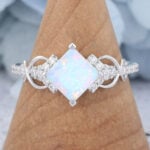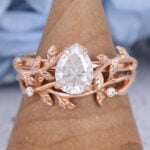Best Metal for Wedding Rings: Choose by Durability, Skin Tone, or Allergy Sensitivity (With Pros and Cons)
While gold and silver remain the most traditional wedding band metal choices among the most popular wedding band options, they are far from the only options available. Modern couples today explore a wide range of materials to find the best metal for wedding rings, from timeless platinum to contemporary titanium and even hypoallergenic alternatives like palladium. With so many different types of wedding rings to consider, understanding how various metal types for wedding bands differ in durability, appearance, and comfort can help you choose the one that perfectly reflects your style and daily needs. Read the ring material comparison to better choose.
Gold
Gold is a timeless choice among ring metal types for wedding bands and is also commonly used for engagement rings, valued for its elegance, durability, and long-term worth. Knowing the worth of a gold wedding band helps couples choose wedding band materials that balance style, durability, and everyday practicality. Its malleability allows for a variety of designs, while proper care ensures it remains one of the best metals for wedding rings, engagement rings and other jewelry. Gold also adapts well to different skin tones and can be combined with other metals for a custom look.
Common Alloy Compositions
Yellow Gold: Yellow gold is a classic choice that is soft but durable; it resists tarnish and maintains its warm color, making it suitable for everyday wedding bands.
White Gold: White gold is an alloy coated with rhodium to achieve its silvery finish; it is strong but may need occasional replating to maintain its shine.
Rose Gold: Rose gold is an alloy of gold and copper, giving it a pink tone; it is durable and ages well, developing a subtle patina over time.
Pros and Cons of Gold Wedding Rings
Pros
Gold rings have a classic, timeless appeal.
Durable enough for everyday wear with proper care.
Hypoallergenic for most people, especially higher karats.
Retain value well and are easy to resell or trade.
Cons
Pure gold is soft and can scratch or bend easily.
White gold needs occasional rhodium plating to maintain its shine.
Gold rings can be expensive, especially higher-karat options.
Some people may have allergic reactions to alloys in lower-karat gold.
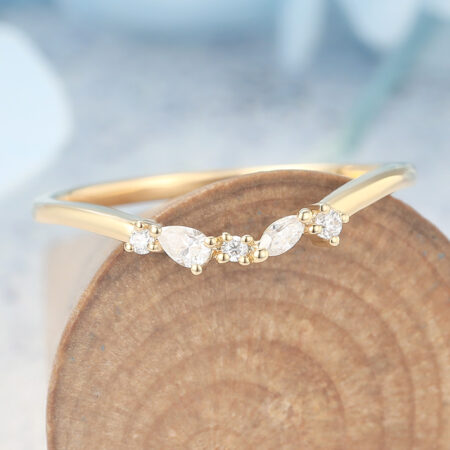
Platinum
Platinum is one of the coolest metals for wedding bands and other wedding jewelry due to its natural white color, strength, and long-lasting durability. Considered the most precious metal for rings, it stands out among the many different metals for rings for being hypoallergenic and resistant to tarnish, making it ideal for sensitive skin. Its ability to hold gemstones securely and maintain a polished look over time makes platinum a top choice when selecting the best metal for wedding rings.
Pros and Cons of Platinum Wedding Rings
Pros
Durable and resists scratching.
Naturally white and maintains its shine without plating.
Hypoallergenic, suitable for sensitive skin.
Cons
More expensive than most other wedding band metals.
Heavier than gold or titanium, may find less comfortable.
Develops a subtle patina over time that may require polishing.
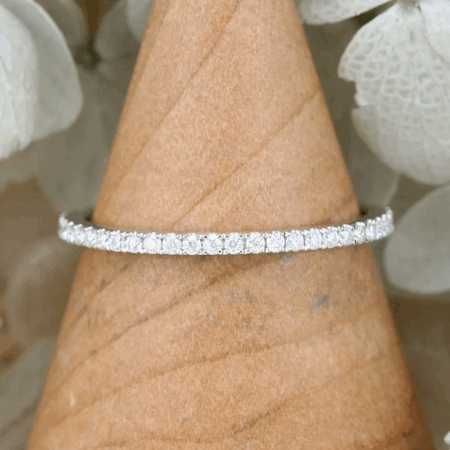
Palladium
Palladium is a naturally white metal that ranks among the strongest wedding band material options available. Its lightweight yet robust nature makes it ideal for couples seeking durable wedding bands that can withstand everyday wear. As one of the reliable wedding ring materials, palladium maintains its shine without plating and is hypoallergenic, making it suitable for sensitive skin. Its subtle color and hardness allow for versatile designs while keeping a polished look for years.
Pros and Cons of Palladium Wedding Rings
Pros
Lightweight yet strong, making it comfortable for daily wear.
Naturally white and maintains its shine without plating.
Hypoallergenic, suitable for sensitive skin.
Cons
More expensive than some other wedding band metals.
Fewer design options are available.
Polishing may be needed occasionally to maintain a bright finish.
Less well-known, resale value may vary.
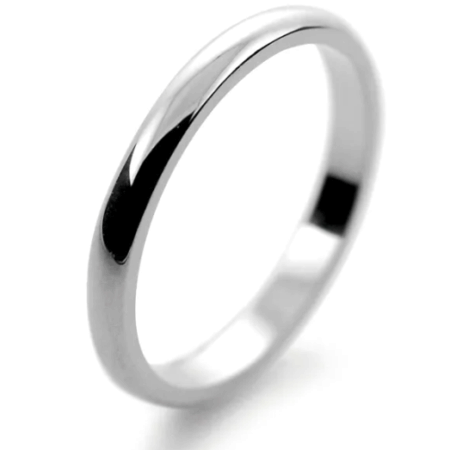
Palladium Wedding Rings
Titanium
Titanium is a lightweight, strong, and corrosion-resistant metal that has become a top choice among male wedding band materials. Its natural silver-gray color can be treated to create a striking finish, including as a black metal for rings, appealing to modern and minimalist styles. Titanium’s combination of durability, comfort, and low maintenance makes it one of the best materials for men’s wedding band, ideal for everyday wear without compromising style.
Pros and Cons of Titanium Wedding Rings
Pros
Lightweight yet exceptionally strong, perfect for long-term wear.
Naturally resistant to tarnish, rust, and corrosion.
More affordable than gold or platinum while offering great durability.
Cons
Cannot be resized once crafted due to its hardness.
May still develop light surface scratches over time.
Tungsten
Tungsten is known as one of the most durable metals for rings, prized for its exceptional hardness and resistance to scratching. Among the types of metals for rings, tungsten stands out for maintaining its polished finish with minimal maintenance. Its naturally gray color can be treated to create black metal wedding rings, offering a bold and modern look. The combination of strength, low upkeep, and striking appearance makes tungsten a popular choice for couples seeking long-lasting, stylish wedding bands, as well as for those looking for the best men’s wedding bands and wedding ring sets.
Pros and Cons of Tungsten Wedding Rings
Pros
Extremely hard and scratch-resistant, ideal for long-lasting wear.
Maintains polished finish with very little maintenance.
Affordable compared to precious metals while offering high durability.
Cons
Cannot be resized due to extreme hardness.
Brittle nature makes it prone to cracking if dropped.
Heavier than some other metals, which may feel less comfortable.
Cobalt
Cobalt is a silver-white metal prized for its hardness and long-lasting shine. Its durability and resistance to scratching make it ideal for durable men’s wedding rings. Lightweight yet sturdy, cobalt retains its polished look over time without plating or frequent maintenance. Its modern metallic appearance and reasonable cost make it a practical choice for couples seeking both style and longevity.
Pros and Cons of Cobalt Wedding Rings
Pros
Extremely hard and scratch-resistant, ideal for long-term wear.
Maintains bright, silver-white shine without plating.
Lightweight yet durable, comfortable for everyday use.
Can be crafted in various finishes, including polished or matte.
Cons
Cannot be resized due to its hardness.
May show minor scratches over time despite high durability.
Alternative Metals and Mixed Designs
Mixed-metal designs, such as combining white gold and rose gold, create unique visual effects and allow couples to express personal style. The growing popularity of alternative wedding ring materials—including black titanium, cobalt alloys, tungsten, tantalum, and stainless steel—reflects a trend toward modern, durable, and distinctive wedding bands, offering more options when choosing the best metal for wedding rings. These designs are ideal for couples seeking customizable, fashion-forward rings that balance aesthetics with long-lasting wear.
Choosing the Best Metal for Wedding Rings
From a Beauty and Skin Tone Perspective: Which Metal Complements You Bes
Selecting the right metal can enhance your skin tone and overall look. Warm skin tones are complemented by yellow gold or rose gold, which add warmth and richness. Cool skin tones pair well with platinum or white gold, creating a bright and elegant contrast. For neutral tones, mixed-metal designs or palladium offer versatility, allowing for a balanced and harmonious appearance.
From a Durability Perspective: Which Metal Lasts Longest?
When choosing the best metal for wedding rings, durability is a key factor. Metals like platinum, tungsten, cobalt, and 14K gold are strong, scratch-resistant, and maintain their shape over time. Titanium and stainless steel are also durable, lightweight, and low-maintenance options. Selecting a strong metal ensures your wedding band withstands daily wear while keeping its appearance for years.
From a Maintenance Perspective: Which Metal Is Easiest to Care For?
When selecting good wedding bands, low-maintenance metals can save time and effort. Platinum, titanium, tungsten, stainless steel, and palladium resist tarnish and scratches, requiring minimal care. 14K gold holds its polish well but may need occasional cleaning. Choosing the best metal for rings ensures your wedding band stays beautiful with little maintenance over the years.
From a Skin-Friendly Perspective: Hypoallergenic Metals for Sensitive Skin
For those with sensitive skin, choosing hypoallergenic metals is essential when selecting the best metal for wedding rings. Platinum, palladium, titanium, and cobalt are gentle on the skin and rarely cause irritation. Among wedding ring types, these metals offer both comfort and durability, making them ideal for everyday wear while maintaining a polished, attractive appearance.
From a Budget Perspective: Best Metals for Every Price Range
Different metals suit different budgets without compromising style or durability. Affordable options like stainless steel, titanium, and tungsten are considered some of the best cheap wedding bands, offering strength and modern looks at lower costs. Mid-range choices, such as 14K gold and palladium, balance quality, appearance, and price. For high-end options, platinum and 18K gold provide luxury, prestige, and long-lasting wear. Considering your budget helps ensure you select wedding bands that are both beautiful and practical.
From a Lifestyle Perspective: Matching Metal to Your Daily Life
Choosing the best metal for wedding rings depends on daily habits and lifestyle. For active lifestyles, titanium and tungsten offer strength and scratch resistance. Platinum and 18K gold represent luxury while remaining durable for everyday wear. Palladium provides a lightweight and comfortable option, ideal for those who prefer ease of wear. Rose gold or mixed-metal designs suit couples seeking a distinctive and personalized style.
Conclusion: Finding the Best Metal for Wedding Rings
Choosing the best metal for wedding rings isn’t just about looks—it’s about how the ring fits your life. Some metals are tough and scratch-resistant, perfect for active hands, while others are light, low-maintenance, or show off a unique style. Think about your daily habits, skin sensitivity, and personal taste to find a ring that feels right and lasts for years.
FAQs About Best Metal for Wedding Rings
What is the best metal for wedding rings?
The best metal for wedding rings depends on your priorities, such as durability, maintenance, skin sensitivity, and style. Platinum and gold are traditional choices, while titanium, tungsten, and cobalt offer modern, durable alternatives.
Which metal is most durable for wedding rings?
Metals like tungsten, titanium, and cobalt are extremely hard and scratch-resistant, making them ideal for couples who want long-lasting wedding bands.
14K vs 18K gold wedding band – which is better?
14K gold is harder and more durable, while 18K gold has higher gold content and richer color. Choose based on durability versus color richness.
Is platinum stronger than titanium?
Titanium is lighter and highly scratch-resistant, while platinum is denser and very durable. Strength depends on the type of wear expected.
How much gold is in a wedding band?
14K gold contains about 58% pure gold, and 18K gold contains about 75% pure gold.
Is titanium a good ring material? Is titanium good for wedding bands?
Yes, titanium is strong, lightweight, corrosion-resistant, and low-maintenance, making it ideal for wedding bands.
Is tungsten metal good for rings?
Yes, tungsten is extremely hard, scratch-resistant, and maintains its polished finish, making it a durable option for rings.
Tantalum vs tungsten rings – which offers better durability?
Tungsten is harder and more scratch-resistant, while tantalum is softer, lighter, and easier to shape. Choose based on durability versus comfort and flexibility.
Cobalt vs tantalum wedding band – which metal suits me best?
Cobalt is harder and more scratch-resistant, while tantalum is lighter and hypoallergenic. Consider durability versus comfort and skin sensitivity.
Are stainless steel rings for men a good choice for durability, style, and everyday wear?
Yes, stainless steel rings are strong, low-maintenance, and modern-looking, making them practical and stylish for daily wear.
Tungsten vs stainless steel wedding bands – how do I decide?
Tungsten is harder and scratch-resistant but heavier and cannot be resized; stainless steel is lighter, durable, and budget-friendly. Choose based on lifestyle and comfort.
 Christmas: 25% off All ltems · Code AFJ25 ·Ends Dec 30 30% off All Items ·On Orders Over $600 – Code AMANDA30
Christmas: 25% off All ltems · Code AFJ25 ·Ends Dec 30 30% off All Items ·On Orders Over $600 – Code AMANDA30

